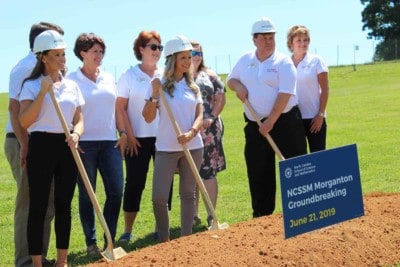The following is a press release from myFutureNC
Yesterday, Governor Roy Cooper signed HB664 into law, codifying one of the highest educational attainment targets in the nation. The bill, sponsored by myFutureNC Commissioner Representative John Fraley (Iredell), garnered tremendous bipartisan support in the House and Senate. Effective immediately, the measure will help guide policy decisions locally, regionally, and statewide, strengthening efforts to bridge North Carolina’s 400,000-person educational attainment gap, ensuring that by 2030, 2 million North Carolinians have a high-quality postsecondary degree or credential.
“The passing of House Bill 664 represents a major milestone for our great state,” said myFutureNC Chairman Dale Jenkins. “This bill brings together business, education, and government leaders to provide North Carolinians with the resources they need to succeed in our competitive job market. North Carolinians should be proud their leaders stand with them to make ‘2 million by 2030’ a reality.”
While experiencing explosive growth in diversity, size, and economic activity, North Carolina is experiencing a skills gap that puts the state at risk. By 2020, 67 percent of jobs across the state will require a postsecondary degree or high-quality credential, but only 49 percent of North Carolinians between the ages of 25 and 44 have completed that level of education.
“As a member of the myFutureNC Commission, I’ve seen firsthand the tremendous collaboration between state, business, and education leaders,” said Rep. John Fraley (Iredell), the primary bill sponsor. “As we pass this bill, North Carolina’s leaders—across all sectors—are further demonstrating a commitment to educational attainment. The measure sets a high bar for our state, and this goal will help keep North Carolina competitive as we seek to add strong, good-paying jobs to our economy. It is essential we work together toward a better-educated North Carolina.”
Recognizing that no one system or organization can tackle this educational and economic crisis alone, myFutureNC brings together North Carolina’s thought leaders in education, business, philanthropy, faith-based and non-profit communities, and leaders of the legislature and Governor’s Office.
“To keep North Carolina competitive, we must empower students with the skills they need for the jobs of today and tomorrow,” said Governor Roy Cooper. “This bill continues that work, but there is more to do. We must continue to set ambitious goals to connect high school graduates with education beyond high school.”
Accolades continue from leadership in the North Carolina General Assembly.
“Education is the great equalizer,” said Senate President Pro Tem Phil Berger. “All North Carolinians deserve an equal opportunity to succeed regardless of birth, income, or ZIP code. Since 2011, the high school graduation rate and the number of adults with a Bachelor’s degree have increased dramatically. We must keep working to equip North Carolinians for the jobs of tomorrow by working together as a state to continue to close the education gap and meet North Carolina’s attainment goal.”
“North Carolina’s continued economic vitality is dependent upon our ability to strengthen and adapt our workforce for the future,” said House Speaker Tim Moore. “There are great jobs and opportunities available to students—but we must ensure they are equipped to fill them. North Carolina’s economy is strong, but it is also changing. This education attainment goal solidifies the state’s obligation to businesses looking to locate here and today’s students who need to be educated to fill tomorrow’s jobs. The visionary and continued work of myFutureNC will further our core mission to make each day in North Carolina a new opportunity for students to succeed in a competitive economy and learn there is no limit to what they can achieve with a great education.”
myFutureNC will work to deepen collaboration across education and workforce sectors to eliminate systemic barriers to achievement, prepare students for work, and expand opportunities for skills training in local communities. Achieving success will be dependent on both state and local leadership, and the Commission will look for the support and engagement of local communities to put the myFutureNC A Call to Action plan in motion.
The codification of the goal follows recent important endorsements from leading statewide organizations. In the past few months, the UNC Board of Governors, the State Board of Community Colleges, NCWorks Commission, the North Carolina Independent Colleges and Universities, the State Board of Education and Governor Cooper’s Education Cabinet, adopted the goal, demonstrating that North Carolina’s education and workforce communities are committed to the work toward making the goal a reality.
For more information, visit www.myfuturenc.org.


